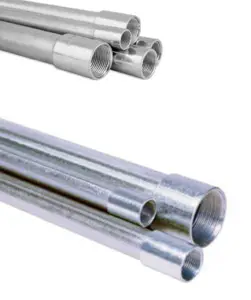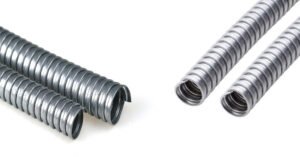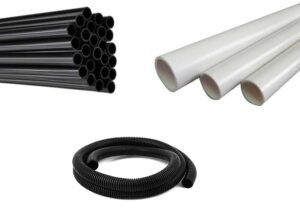Different Types of Conduit Wiring
Conduit wiring refers to a type of electrical wiring where the electrical wires are encased in a conduit, which is a tube made of metal or plastic. The conduit protects the wires from damage and also provides a level of fire resistance. The wires are typically run through the conduit, and then the conduit is attached to the walls or other structures in the building using brackets or straps. This type of wiring is commonly used in commercial and industrial buildings, as well as in some residential applications.
Rigid metal conduit (RMC)

RMC is a type of conduit made of galvanized steel. It is typically used to protect electrical wires in areas where they may be exposed to damage, such as in walls, ceilings, or floors.
One of the main advantages of RMC is that it provides excellent mechanical protection for the wires, and is very durable as it is made of a durable galvanized steel material. This makes it resistant to damage from impact, crushing, and other forces. RMC is also fire-resistant, which can help to prevent fires from spreading through the building.
Another advantage of RMC is that it is very easy to connect to other electrical components, such as boxes, fittings, and outlets. This makes it easy to install and maintain, and it is a popular choice for many applications.
However, there are also some disadvantages to using RMC. One of the main disadvantages is that it can be difficult to work with, as it requires special tools to bend and install. This can make it more time-consuming and labor-intensive to install, which can increase the overall cost of the project. Additionally, RMC is heavier and more expensive than other types of conduits, which can make it a less attractive option for some applications.
Intermediate metal conduit (IMC)
Intermediate metal conduit is a type of conduit that is similar to RMC, but it is made of a lighter-weight material and is easier to work with. It is also more affordable than RMC, making it a popular choice for many applications. IMC is also used commonly in commercial, industrial buildings, and residential applications.
The main advantage of IMC is that it is easier to work with than RMC, as it can be bent and installed using standard tools. This makes it more efficient to install, which can save time and labor costs.
IMC is also fire-resistant, which can help to prevent fires from spreading through the building.
IMC has a few disadvantages also. One disadvantage is that it may not provide as much protection for the wires as RMC, as it is made of a lighter-weight material. This can make it less suitable for applications where the wires may be exposed to heavy wear and tear. Additionally, IMC is not as flexible as other types of conduits, which can make it difficult to install in tight spaces or around corners.
Electrical metallic tubing (EMT)
This is a type of conduit that is made of thin-wall galvanized steel. It is lightweight and easy to work with, and it is often used in residential applications.
EMT is very lightweight and easy to work with, which makes it efficient to install. It can be bent and shaped using standard tools, and it is easy to connect to other electrical components. This makes it a popular choice for many residential applications.
EMT also ensures the protection of the wires from mechanical impacts, as it is made of a durable galvanized steel material. This makes it resistant to damage from impact, crushing, and fire-resistant.
But it may not be as durable as other types of conduits, as this is made of a thin-wall galvanized steel. This can make it less suitable for applications where the wires may be exposed to heavy wear and tear
Flexible metal conduit (FMC)

FMC is made of a flexible metal material, such as galvanized steel or aluminium. It is typically used in applications where the conduit needs to be bent or curved, which makes it easy to install in tight spaces or around corners. This makes it an ideal choice for many applications where other types of conduits may be difficult to use. FMC is also easy to connect with.
Another advantage of FMC is that its durable metallic material can provide good protection for the wires. FMC is also fire-resistant, which can help to prevent fires from spreading through the building.
The main disadvantage of FMC is that it may not provide as much protection for the wires as other types of conduits, as it is made of a flexible metal material. Additionally, FMC is more expensive than other types of conduits, which can make it a less attractive option for some applications.
PVC conduit wiring

It is a type of electrical wiring where the electrical wires are encased in a conduit made of polyvinyl chloride (PVC), a type of plastic material. Both flexible and rigid types of PVC pipe are available. PVC conduit is commonly used in residential and commercial buildings, as it is affordable, lightweight, and easy to work with. It is also resistant to corrosion, which makes it a good choice for use in damp or moist environments.
One of the main advantages of PVC conduit wiring is that it is very affordable and easy to install. It can be bent and shaped using standard tools, and it is easy to connect to boxes and outlets. This makes it a popular choice for many residential and commercial applications.
But PVC conduits may not provide as much protection for the wires as other types of conduits, as it is made of a plastic material. This can make it less suitable for applications where the wires may be exposed to heavy wear and tear. Additionally, PVC conduit is not as durable as other types of conduits, and they may not be able to withstand the same level of impact or crushing forces.
Conclusion
Each type of conduit wiring has its own unique applications, advantages, and disadvantages. For example, RMC is very durable and provides excellent protection for the wires, but it is difficult to work with and may require special tools. IMC is easier to work with and more affordable than RMC, but it may not provide as much protection for the wires. EMT is lightweight and easy to work with, but it may not be as durable as other types of conduits. FMC is flexible and can be easily bent or curved, but it may not provide as much protection for the wires as other types of conduits. PVC is lightweight, easy, and corrosion-resistant but may not provide as much protection.